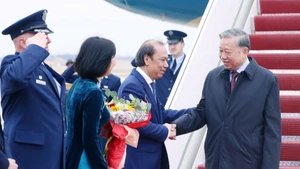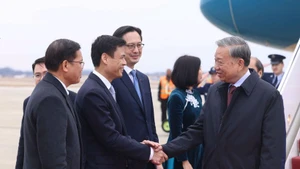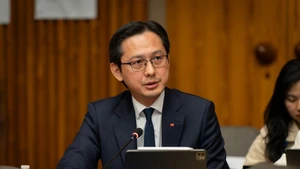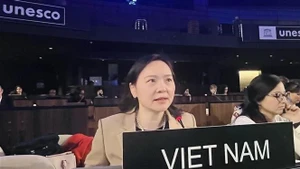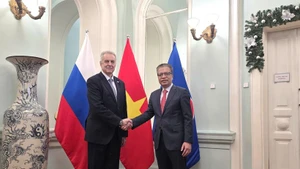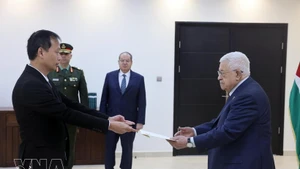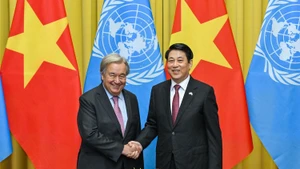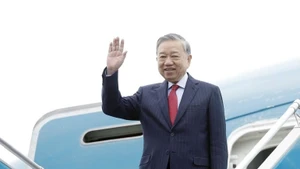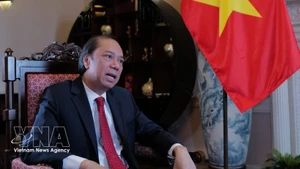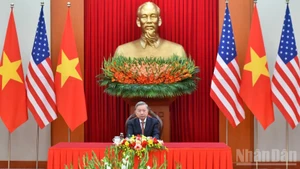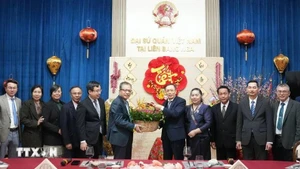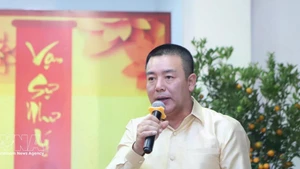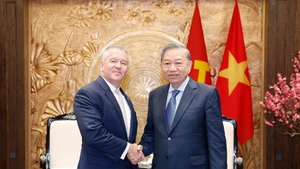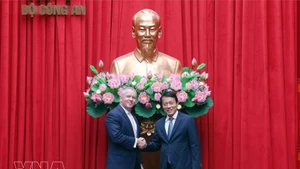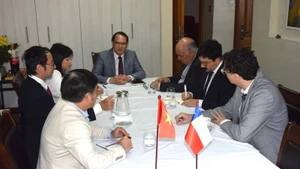Since the country's peace and reunification, the Party and State of Vietnam have consistently implemented a foreign policy of independence, self-reliance, peace, cooperation and development; multilateralization and diversification of foreign relations; proactive and active international integration; being a friend, a reliable partner and a responsible member of the international community.
On November 23, 2012, the Politburo approved the "Overall Plan on Vietnam's participation in United Nations peacekeeping operations". On April 10, 2013, the Politburo issued Resolution No. 22-NQ/TW on international integration, which set out the direction of “Proactively and actively participating in multilateral institutions, including participating in activities at a higher level, such as United Nations peacekeeping activities”.
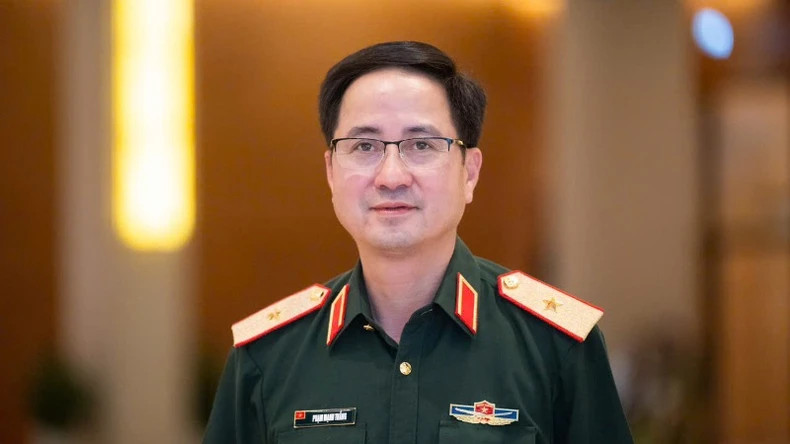 |
| Major General Pham Manh Thang, Party Secretary, Director of the Vietnam Peacekeeping Department. (Photo: Vietnam Peacekeeping Department) |
On May 27, 2014, the Ministry of National Defence announced the Decision to establish the Vietnam Peacekeeping Centre (the predecessor of the Vietnam Peacekeeping Department today) and sent the first two military officers to perform United Nations peacekeeping missions as liaison officers at the South Sudan Mission. This was a historical milestone marking Vietnam's official participation in United Nations peacekeeping activities.
Spreading the image of a peace-loving nation
Since 2014, Vietnam's journey of participating in the United Nations peacekeeping forces has made important marks. According to Major General Pham Manh Thang, Party Secretary and Director of the Vietnam Peacekeeping Department: "In the past 11 years, from the first officers on individual missions at the United Nations Peacekeeping Mission in South Sudan, to date, Vietnam has successfully deployed 1,083 officers, soldiers of the Vietnam People's Army and People's Public Security officers with 2 types of units and individuals".
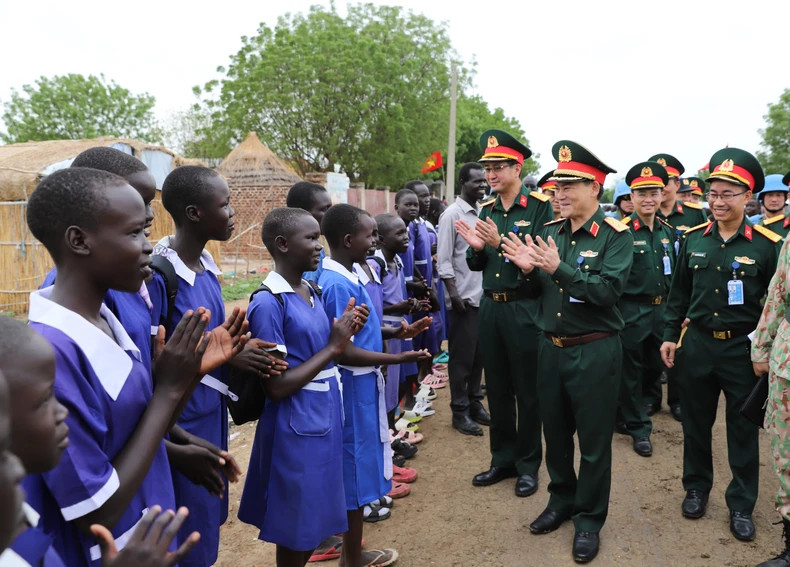 |
| The Vietnamese peacekeeping forces contributes to spreading the beautiful image of "Uncle Ho's soldiers" and the peace-loving country of Vietnam. (Photo: Vietnam Peacekeeping Department) |
In particular, Vietnam has deployed 6 Level 2 Field Hospital squads with 63 soldiers (the first squad was deployed in 2018 in Bentiu, South Sudan); 3 Engineer Squads with 184 soldiers (the first squad was deployed in 2022 in the Abyei region, Africa - an area with complex conflicts); and sent 137 individual officers of the Vietnam People's Army and 16 officers of the People's Public Security to perform tasks at the United Nations Mission in the Abyei region, the United Nations Mission in South Sudan, the United Nations Mission in the Central African Republic and the United Nations headquarters in New York.
Over the past 11 years, from the first officers on individual missions at the United Nations Peacekeeping Mission in South Sudan, Vietnam has so far successfully deployed 1,083 officers, soldiers of the Vietnam People's Army and People's Public Security officers in two types of units and individuals.
Major General Pham Manh Thang, Party Secretary, Director of the Vietnam Peacekeeping Department.
With exemplary courage, style, and a high sense of responsibility, the forcess of the Vietnam People's Army have always completed their missions excellently and have been highly appreciated by the United Nations leaders and international colleagues. The Level 2 Field Hospital teams of Vietnam in South Sudan have provided high-quality health care and treatment to many patients who are United Nations staff and local people; have successfully performed complex surgeries such as microsurgery to reattach the hand of a Pakistani colleague, and airlifted many dangerous pregnant women. The Vietnamese Construction Engineer Company has also demonstrated its high professional capacity, contributing to changing the face of the United Nations Mission in the Abyei region.
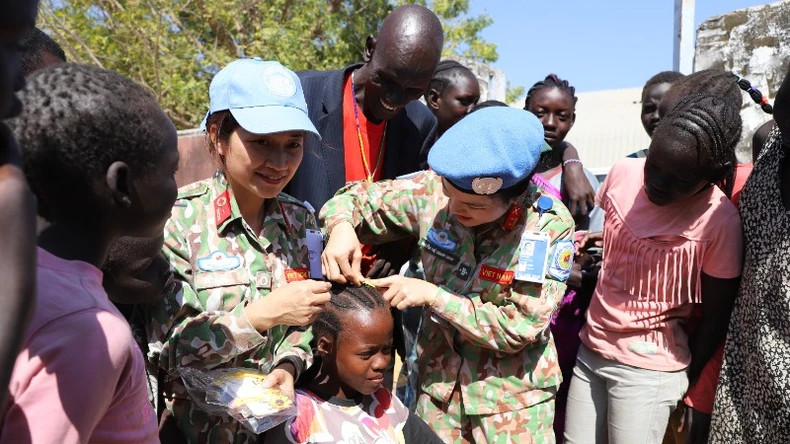 |
| The Vietnamese Blue Berets are always friendly, close and loved by the local people. (Photo: Construction Engineer Company) |
Not only performing the tasks assigned by the United Nations, the Blue Berets of the Vietnam People's Army, including the Level 2 Field Hospital and the Construction Engineer Company and officers deployed in individual form - when participating in the United Nations peacekeeping operations, have organised many meaningful activities to help the local authorities and local people.
The Vietnamese Blue Berets have actively repaired and upgraded roads, helped schools build and renovate classrooms, organised teaching for children, drilled water wells for local people, organised medical examinations, treatment and distributed free medicine to people, guiding people in farming to improve their lives. These noble and meaningful humanitarian actions for the community have helped connect the United Nations Blue Berets at the Mission with the local people. In addition to carrying out the tasks of the United Nations, the Vietnamese Blue Berets have also organised many meaningful activities to help the local authorities and local people.
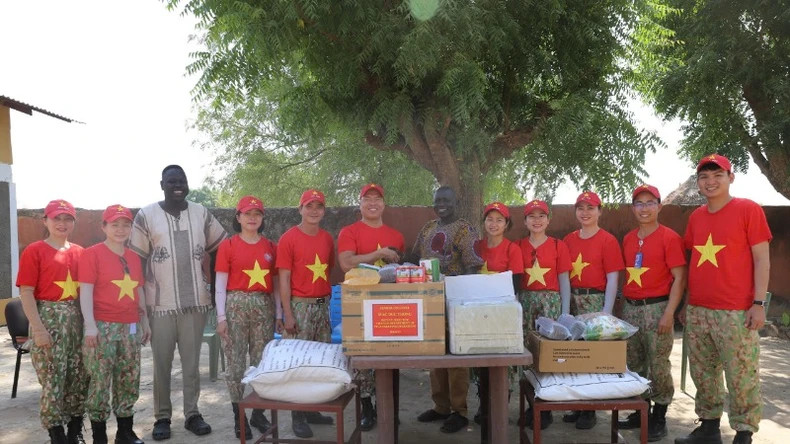 |
| In addition to carrying out the missions of the United Nations, the Vietnamese Blue Berets have also organised many meaningful activities to help local authorities and people. (Photo: Construction Engineer Company) |
The efforts of the Vietnamese Blue Berets have always been highly appreciated by the leaders of the United Nations and the leaders of the Missions. "We have left a beautiful and profound image of the Vietnamese Blue Berets, the image of "Uncle Ho's soldiers" - contributing to spreading the noble humanistic values of the Vietnamese people, a peace-loving nation", said Major General Pham Manh Thang.
Vietnam continues to strive for global missions
In the coming time, facing the increasing demands of international integration and defence diplomacy, building the peacekeeping forces of the Vietnam People's Army to be increasingly professional, disciplined, and modern, becomes more important than ever.
 |
| Vietnam has a higher rate of female soldiers participating in peacekeeping forcess than the average rate of the United Nations. (Photo: KIEU GIANG) |
According to Major General Pham Manh Thang, Vietnam will continue to maintain its forcess in the area and commit to participating more deeply in UN peacekeeping operations, through increasing both the quantity and quality of personnel and equipment, following the requirements, capabilities and conditions of the country; at the same time, increasing the proportion of female soldiers in the forces.
The Vietnamese peacekeeping forces will continue to promote external information, propaganda and education to raise awareness and responsibility among the entire people and army about the position, meaning and importance of this noble task.
In addition, leaders and commanders of agencies and units must regularly disseminate, propagate and educate officers and soldiers to fully understand the purpose, meaning and importance of the UN peacekeeping mission; grasp the Party's international integration and defense diplomacy policies; Vietnam's consistent goals, viewpoints, and stance in international relations (both bilateral and multilateral).
 |
| Vietnam's participation in UN peacekeeping operations aims to consistently implement its foreign policy of independence, self-reliance, peace, proactiveness, and active international integration. (Photo: KIỀU GIANG) |
For the forcess directly participating, it is necessary to equip them with theoretical and practical bases to propagate to the people of the host country to clearly understand that the purpose of the "blue beret" forces's activities is following the United Nations Charter, international law, and contributes to protecting peace in the region and the world. Focus on building political mettle for officers and soldiers, and a responsible attitude in the process of performing tasks, following the provisions and principles of the United Nations Charter. At the same time, determine the determination to overcome hardships and difficulties, and complete the task.
Training and fostering to create resources need to continue to be focused on. This includes a combination of support activities from international partners with extensive experience in the field of peacekeeping, with research, development and organisation of training according to the motto "Basic, practical, solid, specialised", combined with increased practical training and comprehensive exercises.
Faced with the increasing demands of international integration and defence diplomacy, the building of the peacekeeping forces of the Vietnam People's Army to be increasingly professional, disciplined and modern has become more important than ever. (Photo: Vietnam Peacekeeping Department)
Training content focuses on foreign language training; specialised training, peacekeeping knowledge, pre-deployment survival skills, international law, humanitarian law, knowledge about the country, people and regulations of the host country; the situation of the mission, the specific regulations and tasks of the United Nations, etc. Pay attention to supplementing professional knowledge, military medicine, engineering, etc., to ensure that the forcess participating in the United Nations peacekeeping are fully equipped with the necessary knowledge and quickly adapt to the working environment at the Missions.
Coordinate with central ministries, departments and branches to complete the Draft Law on Participation in the United Nations Peacekeeping Forces to submit to the National Assembly for approval at the 9th Session of the 15th tenure in June 2025 to fully institutionalize the Party's guidelines and policies on Vietnam's participation in the United Nations peacekeeping operations, creating a solid, long-term and stable legal corridor for the deployment of forcess participating in the United Nations peacekeeping operations.
May 29 of each year is chosen by the United Nations as the United Nations Peacekeeping Day to recognise the great contributions of this forces to world peace and security.
Director of the Vietnam Peacekeeping Department Pham Manh Thang also said that it is necessary to regularly and effectively conduct preliminary and final reviews, draw lessons, point out shortcomings and limitations, and promptly reward groups and individuals with outstanding achievements in their work.
On that basis, we draw on practical experience to help the staff and officers accumulate a lot of knowledge, practice independent situation handling skills as well as the ability to coordinate according to international codes of conduct, improve the quality and efficiency of work in a multinational environment, and meet the expectations assigned by the Party, State and Army.

